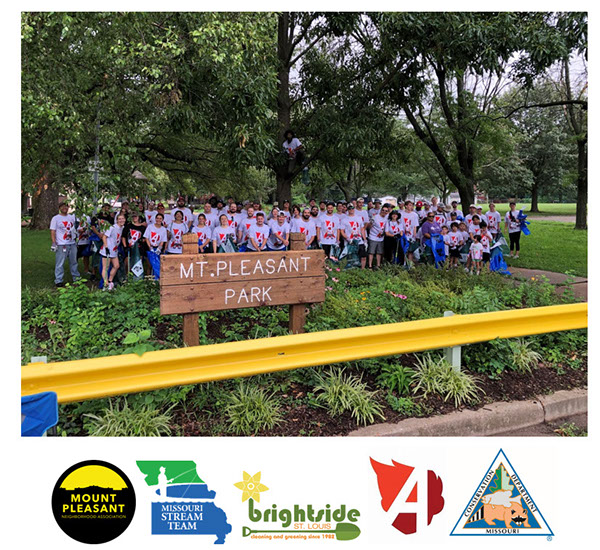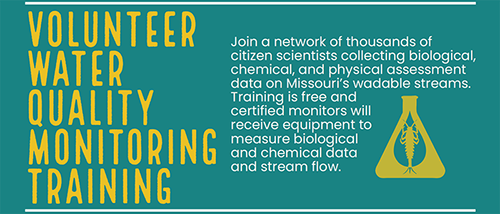
 Receiving Water Quality Notifications from MoDNR
Receiving Water Quality Notifications from MoDNR
By Randy Sarver, Volunteer Water Quality Monitoring Coordinatior/QAQC Officer
Would you like to know about current water quality topics in your area? Would you also like to control what notifications you receive? Then try subscribing to GovDelivery.com through the Missouri Department of Natural Resources.
The first step is to open the following address in your browser. https://public.govdelivery.com/accounts/MODNR/subscriber/new. When connected you should find a screen (see below) that allows you to select your preferred subscription type (Email or text). If you choose Email you will be asked to submit and confirm your Email address. If you choose SMS/Text you will be asked for your cell phone number. There are also options to sign in using your existing Facebook or Google accounts.
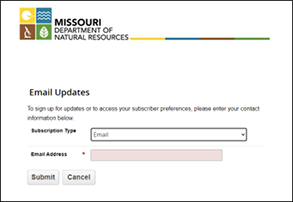
The second step is to select the kind of notifications you would like to receive. If you would like to focus on receiving water quality related notifications, scroll down to Water Alerts (see below). Selecting the Water Alerts check box will subscribe you to many types of notifications. You may not want to receive all notifications. Checking the boxes of individual topics will allow you to receive more selective notifications.
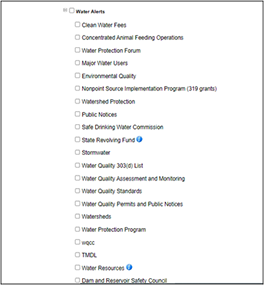
One area you may want to subscribe to is Public Notices. This will allow you to receive notifications in your area that request public participation. There are also other topics that offer information about water quality, such as the Water Quality 303(d) list and TMDL (Total Maximum Daily Loads). These notifications are one way to stay informed about water quality issues in your area or statewide.
If you are interested in notifications from specific counties only, then “click” on the Subscriber Preferences “hot link” on your home screen (see below).

On the Subscriber Preferences page, select the Questions tab.
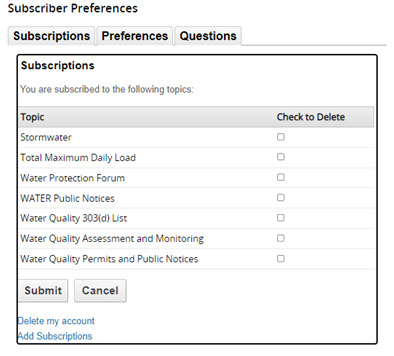
On the Questions page you can check the boxes for specific counties of interest (see below).
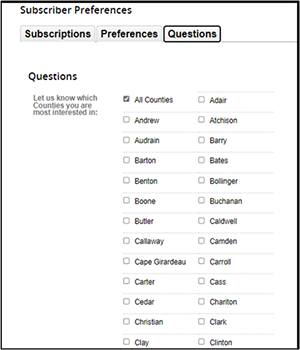
If you want to change your subscriptions at any time, return to https://public.govdelivery.com/accounts/MODNR/subscriber/new and check or uncheck the relevant topics. Or, you can delete your subscription by yourself at any time by selecting the “Delete my account” hotlink on the Subscriber Preferences page.
Mount Pleasant Neighborhood Cleanup
By Brian Waldrop, Volunteer Engagement Specialist, St. Louis and Southeast regions
One hundred seventy volunteers from Abstrakt Marketing Group selected the Missouri Stream Team Program to donate their time for their annual Pay Back Day 2023 in the Mount Pleasant Neighborhood in St. Louis City. The Stream Team Program and Abstrakt have a solid relationship, with Abstrakt donating their time over the last six years.
The partners who assisted with this endeavor were the Mount Pleasant Neighborhood Association (MPNA), St. Louis Develop Corporation (SLDC), and Brightside-STL. Brightside provided trash grabbers and recruited St. Louis City Parks to dispose of the collected trash.
After gathering at Mount Pleasant Park, volunteers received education on how to stay safe while collecting trash, stormwater and the value of having inlets free of debris, and Mount Pleasant history. Caran Hanks (SLDC) thanked the volunteers for their dedicated service to pay back St. Louis Communities; and Mark Swain (MPNA) welcomed the volunteers to his neighborhood. Finally, the volunteers were sent out to the twelve cleanup sites.
Abstrakt’s pay back to the community went beyond the cleanup. During lunchtime, about 40 volunteers ate at The Original Crusoe's Restaurant- a locally-owned food that’s been operating since 1979 within the Mount Pleasant Neighborhood.
After five hours of cleaning up, here is what they picked up.
- Ninety-nine – 50-gallon blue poly bags (Approx. 4.95 tons)
- Eighty-four – 20-gallon green mesh bags (Approx. 1.26 tons)
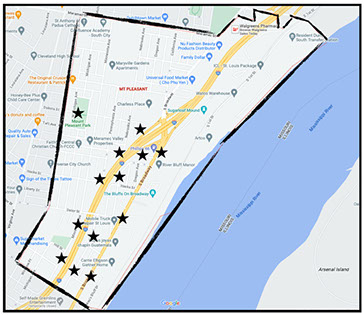
- One plastic bumper
- One body pillow
- Two tires
- Three 10-foot siding pieces
- Two wooden kitchen chairs
- One smelly recliner
- One scanner
- One printer
- Two Christmas Trees
- One pool ladder
- Twelve VHS tapes
- One dresser of drawers with mirror
- One pool liner
- One ash shovel
- Four wooden wall shelves
- Two suitcases
- Multiple pairs of jeans, along with other clothing
- Seven 8-foot-long boards with screws
- Twenty 4-foot-long plastic commercial lighting
- One large wooden cabinet
- One banister
- Multiple storm drains were cleaned of sediment, broken down asphalt, and weeds.
Congratulations to our Ambassador Award Winners for Activities done in 2022
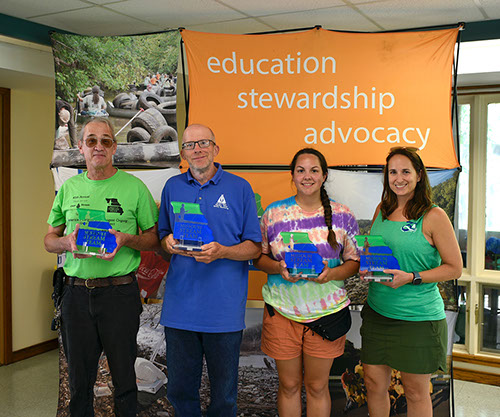
From left to right: Stephen Silver, Ahti Rovainen, Kelly Dunlap, Katie Franke (standing in for Elizabeth James)
Water Quality Monitoring Workshops
Stay Tuned!
Tired of entering your activity reports just to get that pesky error message? Well, good things are coming - the Stream Team program will be launching a new web application by early 2024. This application will allow volunteers to manage their Team, access reports like water quality monitoring data, add monitoring sites, order supplies, report activities, and make those error messages a thing of the past!
Calendar of Events
Wondering how to get started with your new team? Check out our Calendar of Events.
Need help advertising your event? Or struggling to recruit volunteers for a clean-up? We are here to help! Submit a request to advertise through our website calendar, or send an email to StreamTeam@mdc.mo.gov to request an ad through a StreamGram or Facebook post.
3rd Quarter Activity Prize Drawing
3rd Quarter Prizes:
Arctic Zone Cooler (Blue)
Pelican Colorado Canoe
Thermos Backpack Bottle
Youth Prize:
Strange but True Book by Missouri Department of Conservation
.jpg?crc=476904315)


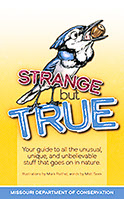
Fill out an Activity Report for your past or upcoming events, and you could win a prize next quarter!
The Falling Leaves and Our Streams
By Malcolm DeBroeck, Volunteer Education & Citizen Science Assistant
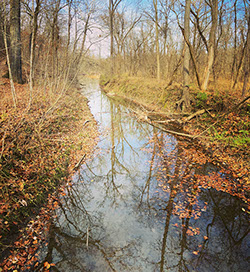 Now that autumn is upon us, leaves are changing colors and will eventually be falling from their branches. On the stream banks, many of these leaves are falling into the stream itself. This means that a lot of our volunteers will have tons of fun sifting through the leaves on their kick net! What this also means is that the leaf litter is providing a large amount of nutrients that the ecosystem needs to survive and thrive. Fish can’t eat the fallen leaves, meaning they can’t get energy from them, so how do the fish benefit from this mass addition of nutrients every year?
Now that autumn is upon us, leaves are changing colors and will eventually be falling from their branches. On the stream banks, many of these leaves are falling into the stream itself. This means that a lot of our volunteers will have tons of fun sifting through the leaves on their kick net! What this also means is that the leaf litter is providing a large amount of nutrients that the ecosystem needs to survive and thrive. Fish can’t eat the fallen leaves, meaning they can’t get energy from them, so how do the fish benefit from this mass addition of nutrients every year?
The answer lies in small creatures in the stream that are sometimes barely visible: aquatic macroinvertebrates. Aquatic macroinvertebrates are very abundant in many Missouri streams, and include creatures like crayfish, snails, worms, and insect larvae such as mayfly and dragonfly nymphs.
Macroinvertebrates use leaves as food to get the energy they need to grow. In return fish can eat the macroinvertebrates and get energy from them. Aquatic macroinvertebrates are the bridge connecting the nutrients in the leaves to the nutrients the fish need. If this bridge collapsed, then so would the rest of the stream ecosystem. Not only would the fish not be able to eat, but there would be other severe consequences.
Aquatic macroinvertebrates consume in some cases over 70% of the leaf litter that falls into the streams. If the macroinvertebrates weren’t there to eat these leaves, then the water would turn very murky, and prevent fish from being able to see and hunt for any other food. Too many leaves in the water could also clog the gills of fish and keep them from breathing properly. Without the macroinvertebrates there to convert the leaves into a usable form of energy, the excess of nitrogen and phosphorus added to streams would create very favorable conditions for oxygen depletions and harmful algal blooms. While some algae in streams is good and perfectly normal, algal blooms can cause fish kills due to oxygen depletion and in some cases can release toxins into the water.
So, whenever you look at the colorful leaves falling into the streams, know that this is a good thing for the stream! The nutrients they add are necessary for the stream itself, but the aquatic macroinvertebrates have the important job of eating the leaves to keep the streams cleaner and to feed the fish.
Since our last issue of Channels, Stream Team members reported:
- 311 total activities
- 1,314 total participants
- 5,532 hours
- 16 tons of trash collected
- 29 water quality monitoring trips
- 116 litter pickups
Check out more highlights below . . .
lpu-20230715_jacks_fork_river_shanon_county_%20photo10-crop-u18425.jpg?crc=4282668303)
Team 713 – Members of the Jacks Fork River Rats clean access points along the Jacks Fork near Eminence. Wonderful work!
lpu_20230616_mcdonald_county_elk_river%20photo%201.jpg?crc=4108924916) Team 4289 – The Gravel Bar Stream Team cleaned up the Elk River in McDonald County. Great Job!
Team 4289 – The Gravel Bar Stream Team cleaned up the Elk River in McDonald County. Great Job!
%2c%20lpu_20230603st_francis_river_st_francis_county%20photo%201-crop-u18431.jpg?crc=145812702) Team 6204 – The St. Francois River is cleaner now thanks to the efforts of the Dirty Oars Stream Team! Fantastic!
Team 6204 – The St. Francois River is cleaner now thanks to the efforts of the Dirty Oars Stream Team! Fantastic!
lpu_20230415_wilsons_creek_greene_county-crop-u18419.jpg?crc=4154480467) Team 6532 – A successful cleanup on Wilson's Creek in Green County by the Forever Wild Stream Team! Awesome!
Team 6532 – A successful cleanup on Wilson's Creek in Green County by the Forever Wild Stream Team! Awesome!
The 100 Club
These are individuals that have contributed more than 100 hours since the last issue:
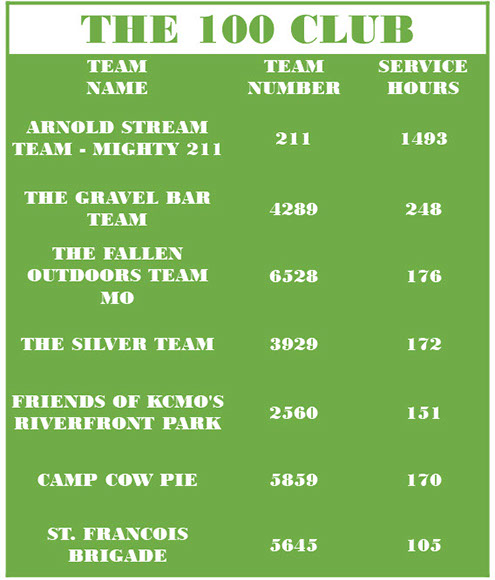
 Missourians Concerned about Wastewater Application Operations
Missourians Concerned about Wastewater Application Operations
By Mary Culler, Stream Teams United Executive Director
In late August, I attended a public hearing held at the Missouri Department of Natural Resources Northeast Regional Office in Macon, MO. The hearing was regarding a draft water pollution permit applied for by Denali Wastewater Solutions, LLC, an Arkansas based company that describes itself as a specialty waste and environmental services company. The company has applied to operate a 15 million gallon wastewater storage basin (with dimensions of 600 ft x 275 ft x 20 ft deep), that would accept waste from dozens of facilities (mostly food and animal processors) from eight states, including Missouri and seven other surrounding states. The stored waste would then be land applied on up to 13 agricultural fields nearby in Randolph County, which are within the Mark Twain Lake watershed, and according to the permit, could also be applied on up to 11 agricultural fields in St. Clair County, which are within the watershed of Truman Reservoir.
The public hearing for this proposed permit was attended by about 200 people, most of whom were concerned residents of Randolph County. Several state legislators and one state senator also attended. People were provided the opportunity to comment on the proposed permit as part of public record, and when the official public hearing came to an end, there was an opportunity for questions from attendees. At least a dozen staff from the Department of Natural Resources attended the meeting and assisted with facilitation and fielding of questions from the public.
Earlier this year, I became aware of the operations of Denali Wastewater Solutions in southwest Missouri, when local residents expressed concern over the spreading of waste and associated odors in Newton and McDonald counties. Due to the proposed permit for the operation in Randolph County, residents have expressed concern to both their county commission and to state government. Local community members who could be affected by the operation have formed a group called the Citizens of Randolph County against pollution (C.R.A.P). Many local residents from this group attended the public hearing in Macon and voiced their concern about negative impacts of the proposed facility on air, water, land, health, property values, quality of life, and the nearby veterans cemetery.
As an advocate for Missouri streams, I commented on several parts of the proposed permit, in particularly about how the Department and the state interprets the agricultural stormwater exemption found in Missouri Clean Water Law 644.059, a new section of state statute that was passed by our state legislature in 2018. This section of Missouri’s Clean Water Law exempts agricultural stormwater from prohibited acts of Missouri Clean Water law; prohibited acts that would be violations for any other individual or type of entity. This is one part of Missouri legislation that has reduced the authority and oversight of the Missouri Clean Water Law in the last decade. It should not be surprising now, that with lessened regulations, Missouri has become an attractive place for out-of-state companies to bring out-of-state waste.
This issue seems to be the beginning of much more awareness by both the Missouri public and elected officials about the inadequacy of parts of Missouri’s Clean Water Law and how recent legislation is leading to real world issues for Missourians. Whereas many times Missourians are known to express support for personal property rights and an indifference to impacts on “waters of the state”, none of the attendees at the public hearing spoke in support of the proposed facility. Also, one elected state representative who represents Randolph County discussed the need for the state legislature to limit the acceptance of out-of-state waste coming into Missouri, indicating an interest of proposing additional regulation to actually strengthen Missouri’s Clean Water Law. It is yet to be seen how the Department and our state will handle this issue. What is clear is that now is the time to reach out to your state elected officials and express your concern about water quality issues you see in your area. Make a 2023 year-end resolution, and contact your state representative and senator by phone, email, or letter and let them know that you care for your local watershed, and bring their attention to water quality issues you have observed.
Receiving Water Quality Notifications from MoDNR
Mount Pleasant Cleanup
Announcements, Activity Prizes, and more!
Monitoring Minute
Riffle Review
Coalition Corner
%2c%20lpu-20230404%2c%20turner_south_oregon-crop-u18458.jpg?crc=384242251)

Fall 2023
